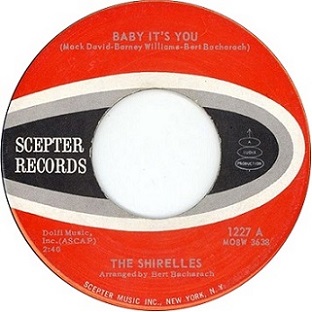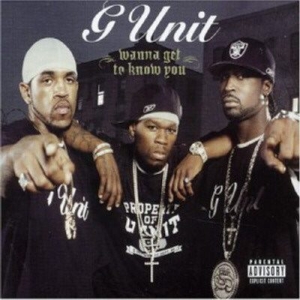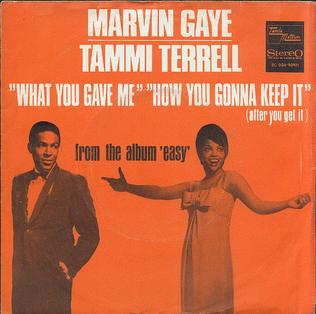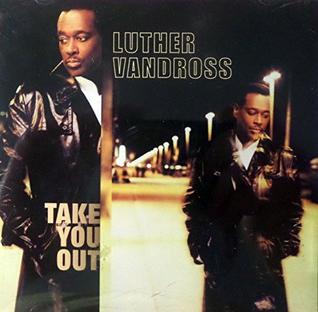Related Research Articles

"I Can't Get Next to You" is a 1969 No. 1 single recorded by the Temptations and written by Norman Whitfield and Barrett Strong for the Gordy (Motown) label. The song was a No. 1 single on the Billboard Top Pop Singles chart for two weeks in 1969, from October 18 to October 25, replacing "Sugar, Sugar" by the Archies and replaced by "Suspicious Minds" by Elvis Presley. The single was also a No. 1 hit on the Billboard Top R&B Singles for five weeks, from October 4 to November 1, replacing "Oh, What a Night" by the Dells, and replaced by another Motown song, "Baby I'm For Real" by the Originals.

"Let Me Love You" is a song by American singer Mario, released as a single on October 4, 2004, from his second studio album, Turning Point (2004). The song was written by Ne-Yo, Kameron Houff, and Scott Storch, while the production was handled by Storch. The song garnered Mario a Grammy Award nomination for Best Male R&B Vocal Performance in 2006 and became a top-10 hit worldwide, reaching number one in the United States, Canada, Germany, the Netherlands, and New Zealand.

"Yeah!" is a song by American singer Usher featuring American rappers Lil Jon and Ludacris. The song is written by the featured artists alongside Sean Garrett, Patrick "J. Que" Smith, Robert McDowell, and LRoc. The song incorporates crunk and R&B—which Lil Jon coined as crunk&B—in the song's production. The song was released as the lead single from Usher's fourth studio album Confessions (2004) on January 26, 2004, after Usher was told by Arista Records, his label at the time, to record more tracks for the album.

"You Don't Know My Name" is a song recorded by American singer-songwriter Alicia Keys for her second studio album The Diary of Alicia Keys (2003). It was written by Keys, Kanye West and Harold Lilly, and produced by Keys and West. The song contains a sample from the 1975 song "Let Me Prove My Love to You", written by J. R. Bailey, Mel Kent and Ken Williams and performed by The Main Ingredient. It was released as the lead single from The Diary of Alicia Keys on November 10, 2003, by J Records.

"If I Ain't Got You" is a song recorded by American singer-songwriter Alicia Keys for her second studio album The Diary of Alicia Keys (2003). Inspired by the 2001 death of singer Aaliyah, the September 11 attacks, and other events in the world and in Keys' life, the song is about "how material things don't feed the soul". It was released as the second single from The Diary of Alicia Keys on February 17, 2004, by J Records. The single cover depicts Keys similarly to the subject of Man Ray's 1924 photograph Le Violon d'Ingres.

"Baby It's You" is a song written by Burt Bacharach (music), Luther Dixon, and Mack David (lyrics). It was recorded by the Shirelles and the Beatles and was a hit for both. The highest-charting version of "Baby It's You" was by the band Smith, who took the track to number 5 on the US charts in 1969.

"Until You Come Back to Me (That's What I'm Gonna Do)" is a song written by Morris Broadnax, Clarence Paul, and Stevie Wonder. The song was originally recorded by Stevie Wonder in 1967, but his version was not released as a single and did not appear on an album until 1977's anthology Looking Back. The best-known version of this song is the 1973 release by Aretha Franklin, who had a million-selling top 10 hit on Billboard charts. The song reached No. 1 on the R&B chart and No. 3 on the Hot 100 chart in 1974. It became an RIAA Gold record.

"If You Don't Know Me by Now" is a song written by Kenny Gamble and Leon Huff, and recorded by the Philadelphia soul musical group Harold Melvin & the Blue Notes. It became their first hit after being released as a single in September 1972, topping the US R&B chart and peaking at number 3 on the US Billboard Hot 100.

"My Boo" is a duet between American R&B singers Usher and Alicia Keys, written by Usher, Keys, Jermaine Dupri, Adonis Shropshire, and Manuel Seal. It was included on the re-release of Usher's fourth studio album, Confessions (2004). The song was released as the album's fourth single in 2004. Set over a hip hop-style track, it was produced by Dupri and No I.D.

"Wanna Get to Know You" is a song recorded by G-Unit. It was released in January 2004 through Interscope Records and 50 Cent's G-Unit Records as the third single from their 2003 debut album, Beg for Mercy.

"What You Gave Me" is a hit duet written and produced by Ashford & Simpson and issued as a single originally by the vocal duo of Marvin Gaye and Tammi Terrell in 1969 on the Tamla label.

"Wake Up Everybody" is an R&B song written by John Whitehead, Gene McFadden and Victor Carstarphen.

"I'll Be Good to You" is a 1976 hit song by R&B duo the Brothers Johnson. George Johnson, one of the two Johnson brothers in the band, wrote the song after deciding to commit to a relationship with one woman, instead of dating several at a time. While George was recording a demo for the song, family friend Senora Sam came by and added some lyrics. Brothers Johnson producer and mentor Quincy Jones heard the song, liked it, and convinced George to sing lead on the finished track. Released from their debut album, Look Out for #1, it was a top-ten hit on the Billboard Hot Singles Charts, peaking at number three, and a number one song on the Billboard R&B Charts during the summer of 1976. The single was later certified gold by the RIAA.

"She's Not You" is a 1962 song recorded by Elvis Presley and released as a single on RCA Victor.

“You Gotta Have Love in Your Heart” is a duet single between Motown singing groups The Supremes and the Four Tops, released as a single from their The Return of the Magnificent 7 album in 1971. The single became a modest charter peaking at #55 on the U.S. Billboard Hot 100 chart and #41 on the U.S. Billboard R&B Singles Chart. The single fared better in the UK, where it reached #25 in the official top 50 single chart. Lead vocals were by the groups' respective lead singers Jean Terrell and Levi Stubbs.

"Take My Heart (You Can Have It If You Want It)" or "Take My Heart" is a 1981 single by Kool & the Gang from their album, Something Special.
"A Rockin' Good Way (to Mess Around and Fall in Love)" is a song first recorded in 1958 by Priscilla Bowman, on the Abner Records label (ABNER DJ 1018). Bowman was given vocal backing by The Spaniels.

"Treat Her Like a Lady" is a 1984 single by American vocal group by the Temptations. Released on November 6, 1984 but airplay October 1984, this is the first single on which Ali-Ollie Woodson was lead singer. The song appears on Temptations' album Truly for You, also released in 1984. The song was co-written by Woodson and Otis Williams, and was co-produced by Woodson and former Earth, Wind & Fire member Al McKay and Ralph Johnson.

"Happy People" is a song by American R&B recording artist R. Kelly. Like Kelly's previous single, "Step in the Name of Love", the song is about the stepping dance. It was released on March 22, 2004, as the lead single from his second double album, Happy People/U Saved Me (2004). The song went to number 19 on the US Billboard Hot 100 and number seven on the Billboard Hot R&B/Hip-Hop Singles & Tracks chart. In some territories, it was released as a double A-side with "U Saved Me"; this issue peaked at number six in the United Kingdom.

"Take You Out" is a song by American recording artist Luther Vandross. It was written by Warryn Campbell, Harold Lilly, and John Smith and produced by the former for Vandross's self-titled twelfth studio album (2001). Released as the album's lead single, the song topped the US Adult R&B Songs chart and became a top ten hit on the Hot R&B/Hip-Hop Songs, while peaking at number 26 on the Billboard Hot 100. "Take You Out" was later interpolated by American rapper Jay-Z in his song "Excuse Me Miss", on his album The Blueprint 2: The Gift & The Curse, released in 2002.
References
- ↑ Whitburn, Joel (2004). Top R&B/Hip-Hop Singles: 1942-2004. Record Research. p. 124.